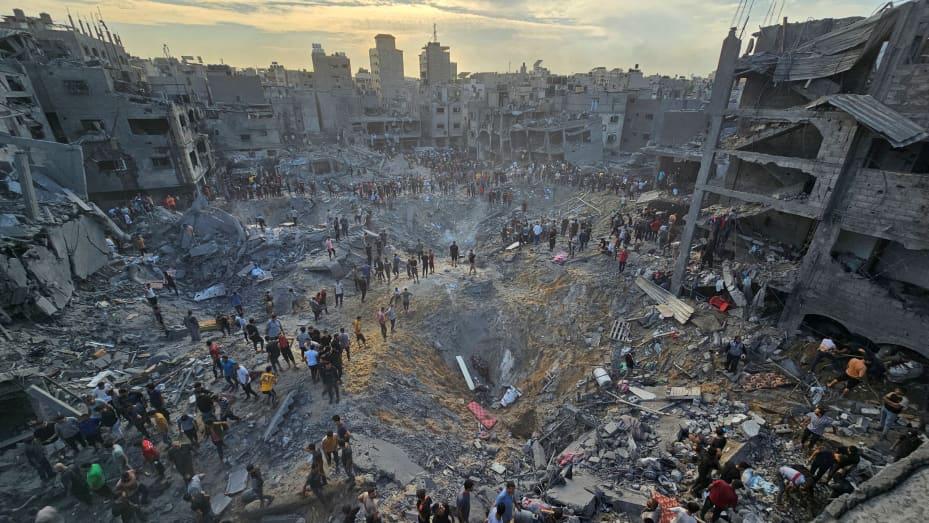
The Middle East might be thousands of miles away from Europe and the United States. But social media and fast-paced sharing platforms have made identifying and living a conflict on a different continent easy. The battle didn’t spill over into neighboring countries but was exported to cities and streets that witnessed a direct connection. Cultures have disseminated everywhere, and they’re now becoming the main channel for change and action, defence, and sometimes going as far as affecting policies.
By Marita Kassis
The Israel-Hamas war has left the world in a severe dichotomy and a media frenzy based on who can get the most heartbreaking story first and from which side. The war that started on Oct. 7 has gone far beyond the Middle East, touching societies to their core and bringing up to the surface cultural stigmas, historical misconceptions, and hatred that were thought to have been addressed or at least progressed.
There is a blatant misconception about calling for the opening of humanitarian corridors, a truce, or asking for more trucks to make their way through the Rafah crossing with Egypt. Defending unarmed civilians, children, women, hospitals, journalists, and every other protected premises or people under international war should not be accused of anti-Semitism or aggressive rhetoric against the opposing side.
Every state, country, or people has the right to defend themselves. This right is enshrined in every constitution, every human rights provision, and every charter of international organization.
What Hamas did on Oct.7 is in no way excused or tolerated. However, to fully understand what triggered the October massacre, there should be a deep dive into the historical context that has plagued the Israeli-Palestinian relationship for decades. Again, it does not provide a cover to blatantly disregard human lives and take hostages, but it does give an understanding of the lead-up to that day.
It is also necessary to realize that, as humans, there is no superiority in nationalities. Wealth and natural resources set countries apart, but humanity does not. The segregating, racist mentality of people being superior to others is what has caused wars and apartheid, but one that has also led to liberation, freedoms, and great moments with leaders that have forever reshaped the course of history and modern-day politics.
The Israeli-Palestinian file has taken its roots in 1948 since the establishment of the State of Israel and the occupation of Palestinian territories. It was born due to the Balfour Declaration, signed in 1917, whereby Britain singlehandedly announced “the establishment in Palestine of a national home of the Jewish people.” The letter Arthur James Balfour wrote was contested and ripped apart, trying to make sense of it, knowing that it had contracted two previous agreements that Britain had spearheaded in the region.
The mandate was a tactical maneuver Britain instigated to rally Jewish support during WWI. Once WWII was over and the United Nations voted on Resolution 181: the Partition Plan, Israel was established in 1948, preceded by a Jewish mass exodus into the area. By 1949, 750,000 Palestinians were displaced, and what was known as the state of Palestine became divided into three regions: Israel, the West Bank, and the Gaza Strip.
This is the most prolonged modern-day conflict and doesn’t seem to be subsiding. Borders keep being redrawn, Israeli settlements are constantly expanding, and Palestinian geographic relocation is becoming a defacto, with occupied lands taking the form of payments. The ground has metamorphosed throughout the years, and based on the political support given at the time, the wave of change would ebb and flow in different directions to either party.
The political support that Israel received internationally upon the acknowledgment of the massacre that took place on Oct. 7 was proper in condoning such an act of violence and terror against unarmed civilians. Yet the foreign policy and stances that most powers adopted, while disregarding the Palestinian loss of life, have affected countries’ fragile internal cultural balance.
National security revolves around far more than oil and military might; it also rests on cultural amalgamation, respect, and understanding of the other. More than ever, we’re witnessing clashes of cultures within national borders. Hate crimes are on the rise, social stigmas are increasingly dictating relations, and racism is rampant in most conversations. Unfortunately, World leaders have miscalculated the effect of their foreign policy within their borders.
Most countries are home to immigrants from around the world and nationals who are now part of the country’s economic wheel and stability. Speeches and endorsements cannot alienate communities without fully understanding the internal effect that it would have on their streets and among its residents.
Samuel Huntington has rightly predicted a clash of civilizations post-Cold War. The Israeli-Hamas war has extended far beyond the Middle East and has reached cities and protesters like never before. The widespread support voiced to the Palestinians is not a token of cultural superiority nor an attack against Israeli society or the victims directly affected by this tragedy. It is the mere recognition that all humans deserve to live and escape the horrors of war.
Hamas, leading a military response against the Israeli army, falls under the rules of engagement during times of war and occupation. But not all Palestinians are Hamas. Not all have partaken or supported the operation led in October, particularly against civilians. Most of them are children, women, and men who would gladly escape the distress and confinement the besieged enclave has forced upon them. Some Palestinian generations know nothing but the current status quo of war.
Israel might have missed a golden opportunity to transfer to its side of the narrative: Palestinians who just want to live, breathe, and have a new lease on life. As of the time of writing, both sides have respected a four-day truce, and an exchange of prisoners is being effectuated with aid trucks finally allowed into the Gaza Strip in decent numbers.
Qatar’s mediation seems to have extended the truce by two days with the transfer of around ten hostages per day. So far, more than 14,800 Palestinians have been killed in Gaza; Israel’s official death toll stands at 1,200. All this without even mentioning the trauma and distress that civilians from both sides will be suffering through.
The US Senate Committee on Foreign Relations has requested from Israel to be more targeted when aiming at Hamas and tied further support to Israel with conditions. As reported by CNN, “Democratic Sen. Chris Murphy on Sunday said he was open to placing conditions on any aid to Israel to reduce civilian casualties in Gaza.”
The conflict is among the most challenging files to settle, with so many players contributing to the equation and too many proxies leading side conversations. Even before October, the West Bank was witnessing sporadic attacks and increased violence between Arabs and Israelis.
It’s never been calm or stable, and no two nations can coexist without constant geographical infringement and limitation of freedoms. The presence of groups like Hamas, whom many designate as a terrorist group, and the continuing illegal expansion of Israeli settlements cannot pave the way to a permanent solution where both sides exist peacefully without fearing the other.
International calls are now focusing on a post-war Gaza, its authority, and its borders. The constant bombing of the enclave has turned much of northern Gaza into a cradle of rubble with barely any surviving infrastructure. Internally displaced persons (IDP) have reached 1 million, and the homes they once knew were razed to the ground.
According to the UN, “over 41,000 homes — 45% of Gaza’s total housing stock — are too destroyed to be lived in.” So far, Hamas has been the de facto authority on the ground, the Palestinian Authority (PA), the one ruling in the West Bank. Who will be in control in Gaza? Who will rebuild?
But it’s a more extended settlement that everyone is aiming for. The two-state solution based on the 1967 internationally recognized borders is being once again pursued. Supported by UN Resolution 242, the Camp David Accords, and international recognition, the two-state solution became the most sought response to the conflict without providing too many details on how it would unfold, especially with so many illegal settlements being scattered.
Nevertheless, it remains the first international solution that world leaders are rallying behind. President Joe Biden recently stated, “The only ultimate answer here is a real two-state solution.”
The question remains, though, how the political situation would be in the Gaza Strip post-war. Who will lead it? Based on which borders? What of Hamas? And how to establish a pattern of coexistence between two nations ruled by a segregating rhetoric built around a reality of occupation and land disputes.





